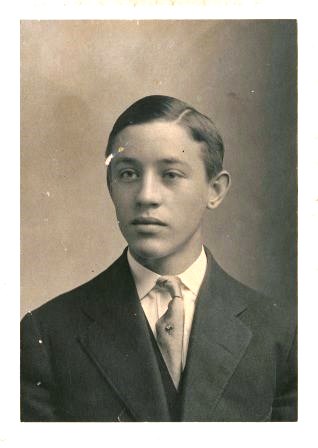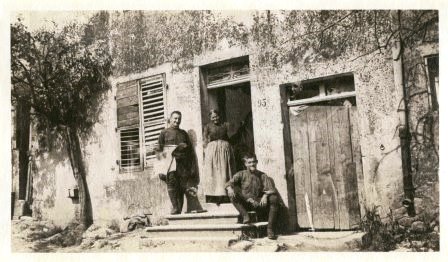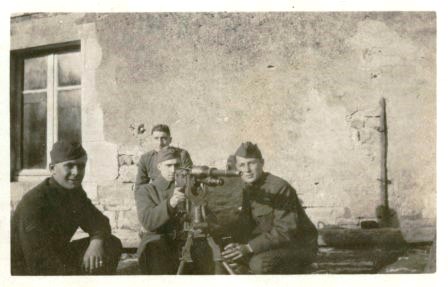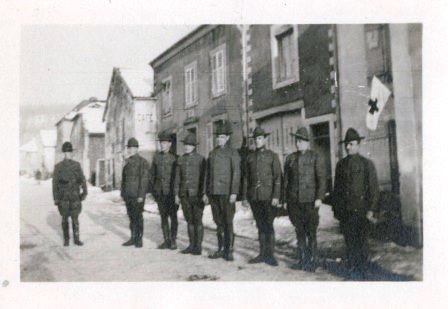By Susan Martin, Collections Services
I’d like to introduce Charles Cornish Pearson, a young man who served during World War I in the 101st Machine Gun Battalion, 26th Division, American Expeditionary Forces. The MHS acquired his papers a few months ago, but as I looked at them more closely, I realized there was so much good material that I’m going to stretch his story out over several posts. I hope you’ll enjoy it as much as I have. The collection also came to us with 32 terrific photographs, undated and mostly unidentified, some of which I’ll be using as illustrations.

Charles C. Pearson was born on 2 April 1890, the son of Charles H. and Gertrude (Cornish) Pearson. He grew up in Arlington, Mass. with his older brother Bill and younger sister Jean. He graduated from Somerville Latin High School in 1908 and Massachusetts Agricultural College in 1912. The MAC yearbook described him like this:
This is little “Napoleon.” When he came here, he hit the studies hard and now he doesn’t have to plug, because the “Profs.” pass him on general principles. He holds the reputation of being one of the really good-looking men in the class who doesn’t fuss. “Connie” had an awful time electing his courses. He wanted to take everything, but of course they wouldn’t let him. We shouldn’t be a bit surprised to see him a member of Phi Kappa Phi.
Charles worked as a salesman after college, specifically as manager of the Hartford, Conn. office of E. Naumburg & Co. The U.S. entered World War I on 6 April 1917, Charles enlisted 12 June, was appointed corporal 1 July, and shipped out to France in early October. His letters at the MHS were written primarily to his mother Gertrude, his father Charles, his aunt Florence, and his brother and sister. He signed his correspondence variously as Charles, Cornish, C.C.P., and most often as “Buster,” but I’ll just call him Charles for simplicity’s sake.
Philip S. Wainwright’s History of the 101st Machine Gun Battalion, published in 1922, is a great resource for all things 101st. I’ll be using Wainwright’s text to add some details, but I want to focus primarily on Charles’ letters, his personal reaction to events, and his evolution over the course of the war.
Spirits were high as the men of the 101st embarked for Europe, and Charles’ first letters home were sent from “a little village in France” in November 1917. He wasn’t allowed to reveal his exact location, but I learned from Wainwright that Charles was stationed in Mont-lès-Neufchâteau in the northeastern part of the country. He was cheerful, except when it came to the weather, which was too wet and muddy for his liking. (A recurring motif.) He urged his family to write often and requested a number of items from home, including clothes, toiletries, cigarettes, and especially reading material. He also reassured them.
Believe me you & Dad and the rest of the family are constantly in my mind, and for your part don’t worry about me, have been in fine health ever since I left Niantic and believe I will keep so, and as regards getting into actual fighting why that is too far off to start worrying about.
Things had been fairly quiet for Charles so far. The training was rigorous, but he suffered few hardships, except monotony. He also liked the locals, despite the language barrier.
The French people here in the village are an interesting lot. Understand practically no English & as most of us are lacking in French, we don’t make much head way. However they all seem only too glad to do what they can for us & jabber away in French just as though we could understand every word they said.

The men of the battalion were “looking forward to when we begin to do our bit” and working hard to master their weapons and other equipment. Two days before Christmas, Charles wrote to his mother about some of this training.
Had my first experience with gas today. Tried out a couple of the masks we have issued to us. We non-coms had the pleasure of going into what they call a gas chamber (which in truth was a well built cattle shed) put on our masks & let them turn the gas on. Nothing very exciting happened if you did things as directed but if not well you would be lucky if you got away with slight sickness. […] However we have to get used to them, learning how to put them on quickly, test for gas etc, so that when we get up against the real thing why we will know what to do.

The 101st Machine Gun Battalion celebrated Christmas 1917 with the French villagers of Mont-lès-Neufchâteau. Many soldiers received care packages from home, and Charles described the meal and entertainment. The holiday was “complete except for being away from our families and believe me you could notice a far away look in the boys faces as they opened their packages and thought of the folks at home.”

Join me in a few weeks when I pick up the story of Charles Cornish Pearson in his new year and ours.

